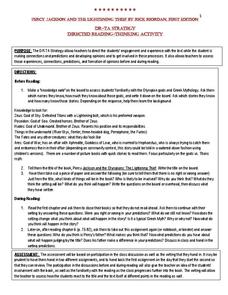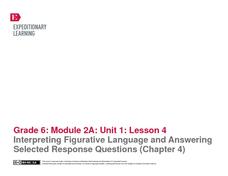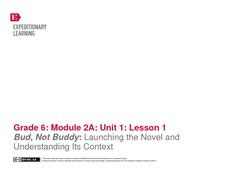Novelinks
The True Confessions of Charlotte Doyle: Writing Response
Prior to reading chapter 15 of the book, The True Confessions of Charlotte Doyle by Avi, examine the painting, Shipwrecked by Edward Moran, and respond to the feelings that arise within and how it relates to the characters of the novel.
Novelinks
The True Confessions of Charlotte Doyle: Cognitive Enhancement
Put your thinking cap on, it's quiz time! Here, scholars use their knowledge of the book, The True Confessions of Charlotte Doyle by Avi to create six questions to be used in their upcoming quiz.
Novelinks
The True Confessions of Charlotte Doyle: Problematic Situations
When is it okay to go against authority and what can happen if you do? This is the leading question in this activity to accompany your classroom reading of The True Confessions of Charlotte Doyle by Avi. After reading chapter eight,...
Curated OER
The True Confessions of Charlotte Doyle: KWHL
After completing the 11th chapter of The True Confessions of Charlotte Doyle by Avi, take part in a KWHL chart driven by the question,When is it appropriate and admirable to defy authority? Focusing on codes of conduct, scholars...
Curated OER
The True Confessions of Charlotte Doyle: Graphic Organizer
After completing the first five chapters of The True Confessions of Charlotte Doyle By Avi, use direct quotes to make inferences about how Charlotte feels about certain characters. Later, when the novel has concluded, revisit the text to...
Novelinks
The True Confessions of Charlotte Doyle: Magic Square Vocabulary
After reading chapter one of The True Confessions of Charlotte Doyle by Avi, take part in a magic square vocabulary activity in which scholars match the term with its definition and insert its corresponding number in to the magic square...
Novelinks
The True Confessions of Charlotte Doyle: Guided Imagery
Prior to reading The True Confessions of Charlotte Doyle by Avi, spark engagement, and step into the shoes of Charlotte Doyle through this guided imagery activity focusing on adventure and the emotions that may be felt along the way.
Brigham Young University
The True Confessions of Charlotte Doyle: Biopoem
Conclude your novel study of The True Confessions of Charlotte Doyle by Avi with this biopoem activity. Get an in-depth look into the personal interests of the poem's subject including feelings, needs, fears, and more!
Curated OER
The Lightning Thief: Directed Reading-Thinking Activity
Before diving into the engaging tale of Percy Jackson and the Lightning Thief by Rick Riordan, conduct this directed reading and thinking activity. Assess your pupils' knowledge of Greek gods and mythology through a knowledge web, and...
Super Teacher Worksheets
Literature Circle Packet
Looking to set up literature circles in your class? Use these materials to support pupils when they meet in groups. Pupils take on various roles over the course of reading and meet with their groups to share the work they have done on...
EngageNY
Getting the Gist and Determining Word Meaning: Paragraphs 20–23 of Steve Jobs’ Commencement Address (and connecting to Chapter 10)
Groups create a list of the character traits of Steve Jobs and Buddy, the main character of Christopher Paul Curtis' Bud, Not Buddy, and share and select evidence from Jobs' 2005 Stanford University Commencement Address to support their...
EngageNY
Interpreting Figurative Language and Answering Selected Response Questions (Chapter 4)
To prepare for an assessment of how well individuals are progressing with their ability to identify and analyze figurative language and its effect on tone and meaning, pairs work through Chapter Four of Christopher Paul Curtis'...
EngageNY
Bud, Not Buddy: Launching the Novel and Understanding Its Context
The first lesson plan in a unit that uses Christopher Paul Curtis' award-winning depression-era novel, Bud, Not Buddy, as the anchor text establishes the routines that will be used throughout the unit.
National Endowment for the Humanities
Mark Twain and American Humor
“The Celebrated Jumping Frog of Calaveras County” is famous, in part, because it established a uniquely American form of humor. For this famous story, Mark Twain combines the tall-tale, the dialect story, and satire. Here is a resource...
Indiana University
World Literature: “Wu Sung Fights the Tiger,” Anonymous - Commentary by Chin Sheng-t’an From Water Margin
Dive into classical Chinese literature with this packet. Provided first is a comprehensive summary and a half-page long historical context of Water Margin. As your class reads the section entitled "Wu Sung Fights the Tiger," pose the...
Curated OER
The Lightning Thief: Vocabulary Strategy
Take an in-depth look into the vocabulary from the novel, Percy Jackson and the Olympians: The Lightning Thief by Rick Riordan. With a list of words to choose from, scholars discover the definition, origin, stories associated with the...
Novelinks
The Lightning Thief: Problematic Situation Strategy
In the novel, Percy Jackson and the Olympians: The Lightning Thief by Rick Riordan, Percy is faced with a major decision. After reading, chapter 19, discuss the decision-making process Percy took, what he decided to do, and what your...
Curated OER
The Lion, the Witch, and the Wardrobe: Graphic Organizer: Venn Diagram
Get to know more about the characters of the novel The Lion, the Witch and the Wardrobe by C.S. Lewis by comparing and contrasting their character traits using a Venn diagram.
Spark Notes
The Two Towers by J. R. R. Tolkien: Study Guide - Mini Essays
For this online interactive literature worksheet, students respond to 8 short answer and essay questions about J.R. Tolkien's The Two Towers. Students may check some of their answers online.
Cliffs Notes
Don Quixote: Study Help Essay Topics and Review Questions
In this literature learning exercise, students respond to 26 short answer and essay questions about Cervantes's Don Quixote. Students may also link to an online interactive quiz on the novel at the bottom of the page.
Spark Notes
Dr. Jekyll and Mr. Hyde by Robert Louis Stevenson: : Study Guide - Mini Essays
In this online interactive literature activity, students respond to 8 short answer and essay questions about Robert Louis Stevenson's Dr. Jekyll and Mr. Hyde. Students may check some of their answers online.
Spark Notes
An Enemy of the People by Henrik Ibsen: Study Guide - Mini Essays
In this online interactive literature worksheet, students respond to 6 short answer and essay questions about Henrik Ibsen's An Enemy of the People. Students may check some of their answers online.
Spark Notes
Heart of Darkness by Joseph Conrad: Study Guide - Mini Essays
In this online interactive literature instructional activity, students respond to 10 short answer and essay questions about Joseph Conrad's Heart of Darkness. Students may check some of their answers online.
SparkNotes
King John by William Shakespeare: Study Guide - Mini Essays
For this online interactive literature worksheet, learners respond to 9 short answer and essay questions about Shakespeare's King John. Students may check some of their answers online.

























